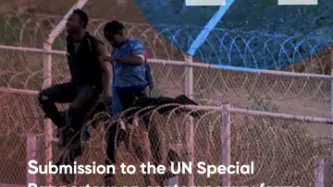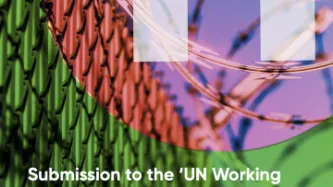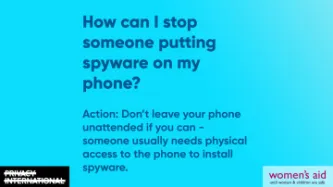Search
Content type: Advocacy
Privacy International responded to the call for submissions on Zimbabwe’s Cyber Security and Data Protection Bill, 2019.
According to its Memorandum, the Bill seeks to “consolidate cyber related offences and provide for data protection with due regard to the Declaration of Rights under the Constitution and the public and national interest.” The Bill also proposes the establishment of a Cyber Security Centre and a Data Protection Authority.
In its submission, PI applauds the positive aspects…
Content type: Case Study
The Ugandan government has a running contract with the Chinese tech giant, Huawei, to supply and install CCTV cameras along major highways within the capital, Kampala, and other cities.
While details of the contract remain concealed from the public, the Uganda Police Force (UPF) released a statement, simply confirming its existing business partnership for telecommunication and surveillance hardware, and software between the security force and Huawei. However, it is not clear whether the…
Content type: Press release
Today, the ICO has issued a long-awaited and critical report on Police practices regarding extraction of data from people's phones, including phones belonging to the victims of crime.
The report highlights numerous risks and failures by the police in terms of data protection and privacy rights. The report comes as a result of PI’s complaint, dating back to 2018, where we outlined our concerns about this intrusive practice, which involves extraction of data from devices of victims, witnesses…
Content type: Advocacy
Privacy International (PI), Fundaciòn Datos Protegidos, Red en Defensa de los Derechos Digitales (R3D) and Statewatch responded to the call for submission of the UN Special Rapporteur on contemporary forms of racism, xenophobia and related intolerance on how digital technologies deployed in the context of border enforcement and administration reproduce, reinforce, and compound racial discrimination.
This submission provides information on specific digital technologies in service of border…
Content type: News & Analysis
Traduction réalisée par Nadine Blum.
Le 29 mai, le Congrès nigérien a voté une loi permettant au gouvernement d’intercepter largement certaines communications électroniques. La loi rend légale l’interception de communications, autorisée par le gouvernement, sans protections appropriées ni mécanismes de contrôle.
La loi a été adoptée avec 104 votes pour – le Parlement nigérien compte 171 membres – et sans la participation de l’opposition qui a boycotté la loi. L’opposition a affirmé…
Content type: News & Analysis
On 29 May, Niger’s Congress voted on a law allowing for broad interception powers of certain electronic communications by the government. The bill makes it lawful for the government to approve the interception of communications without appropriate safeguards or oversight mechanisms.
The law passed with 104 votes – the Nigerien parliament has 171 members – without the participation of the opposition that boycotted the law. The opposition claimed that
the law will allow those, for…
Content type: Advocacy
Privacy International responded to the call for submissions of the Working Group on the use of mercenaries as a means of violating human rights and impeding the exercise of the rights of peoples to self-determination on role of private military and security companies in immigration and border management and the impact on the protection of the rights of all migrants.
This submission builds on PI’s research and reporting highlighting examples of the involvement of private companies in…
Content type: News & Analysis
An estimated 90% of the world’s student population are affected by school closures in the Covid-19 pandemic. And, in the absence of physical space, education technology companies are stepping in to fill the gap. There are plenty of reasons to be excited about the potential of technology to provide support, but it’s important to consider the ongoing implications of which technology we choose, and the implications for those families who don’t have access to them in the first place.That’s why we’…
Content type: Examples
While the agency that manages residence permits, the Coordination of Government Activities in the Territories, is closed, Israel has instructed Palestinians seeking to verify whether their permits to remain in Israel are still valid to download the app Al Munasiq, which grants the military access to their cellphone data. The app would allow the army to track the Palestinians' cellphone location, as well as access their notifications, downloaded and saved files, and the device's camera. …
Content type: Examples
Montreal police have launched an online system to enable residents to report suspicious activity such as group gatherings after police officers noticed significant crowding in certain areas of the city. Both the Montreal police and the province's Sureté du Québec can hand out an on-the-spot $1,000 ticket for both indoor and outdoor illegal gatherings. Travellers returning to Canada who refuse to comply with self-isolation requirements can be fined up to $200,000 and up to six months in prison.…
Content type: Explainer
In a scramble to track, and thereby stem the flow of new cases of Covid-19, Governments around the world are rushing to track the locations of their populace. One way to do this is to leverage the metadata held by mobile service providers (telecommunications companies - "Telcos" - such as Hutchison 3 (Also known as Three), Telefonica (Also known as O2), Vodafone, and Orange) in order to track the movements of a population, as seen in Italy, Germany and Austria, and with the European Commission…
Content type: News & Analysis
A few weeks ago, its name would probably have been unknown to you. Amidst the covid-19 crisis and the lockdown it caused, Zoom has suddenly become the go-to tool for video chat and conference calling, whether it’s a business meeting, a drink with friends, or a much needed moment with your family. This intense rise in use has been financially good to the company, but it also came with a hefty toll on its image and serious scrutiny on its privacy and security practices.
While Zoom already had a…
Content type: Examples
The Northamptonshire Police reported a surge in calls from people reporting their neighbours for exercising more than once a day, holding barbecues in their back yards, or failing to cough into a tissue. Nick Adderley said his officers will issue penalty notices if necessary, but thought it important to first educate the public.
Source: https://www.bbc.co.uk/news/uk-england-northamptonshire-52052830
Writer: BBC
Publication: BBC
Content type: Examples
The Uganda Communications Commission announced on March 22 that it would crack down on people spreading fake videos and misinformation about the novel coronavirus through social media, noting that this behaviour is illegal under the Computer Misuse Act, the Data Protection and Privacy Act, and other penal laws. UCC went on to warn in a public notice that it would arrest and prosecute violators.
Sources:
http://www.china.org.cn/world/Off_the_Wire/2020-03/23/content_75847935.htm
https://twitter…
Content type: Examples
On the second day of India's nationwide shutdown due to the COVID-19 outbreak, the Karnataka government published the home addresses of quarantined residents, as a deterrent to breaking the rules. The list included individuals who had flown in from a foreign country and been asked to stay indoors for two weeks but who had not tested positive for the novel coronavirus. Although the government deleted a tweet announcing its intention, the list is still available on its website and is circulating…
Content type: Examples
Mexico is one of the biggest buyers of next-generation surveillance technology. And now data leaked to Forbes indicates it's taken an unprecedented step in becoming the first-known buyer of surveillance technology that silently spies on calls, text messages and locations of any mobile phone user, via a long-vulnerable portion of global telecoms networks known as Signalling System No. 7 (SS7).
The revelation was contained in what an anonymous source close claimed was…
Content type: Examples
The whistleblower said they were unable to find any legitimate reason for the high volume of the requests for location information. “There is no other explanation, no other technical reason to do this. Saudi Arabia is weaponising mobile technologies,” the whistleblower claimed.
The data leaked by the whistleblower was also seen by telecommunications and security experts, who confirmed they too believed it was indicative of a surveillance campaign by Saudi Arabia.
The data shows requests for…
Content type: Examples
8 europeans telecoms providers (Vodafone, Deutsche Telekom, Orange,Telefonica, Telecom Italia , Telenor, Telia and A1 Telekom Austria) have agreed to share mobile phone location data with the European Commission to track the spread of the coronavirus.
The Commission said it would use anonymsed data and aggregated mobile phone location to coordinate the tracking of the virus spread. They also announced the data would be deleted after the crisis.
Source: https://www.reuters.com/article/us-…
Content type: Examples
After police officers in Paraguay posted videos of themselves punishing people who have been caught breaking quarantine on social media, Paraguayans expressed outrage over their actions. The punishments seen in the videos, which were recorded and shared by the officers themselves, include threatening people with a taser to force them to do star jumps or making them repeat "I won’t leave my house again, officer" while lying face down on the floor. The country's interior minister, Euclides…
Content type: Case Study
The right to privacy is crucial to protect a couple’s equal rights within marriage.
The recent rise of spyware as an “off-the-shelf” product that anyone can purchase has been extremely worrying, as installing spyware on someone else’s phone means getting access to their contacts, their messages, their google searches, their location and more - all without them knowing.
Spyware is, increasingly, becoming another way for abusive spouses to control and monitor their partners. Nearly a third of…
Content type: Explainer
In a scramble to track, and thereby stem the flow of, new cases of Covid-19, Governments around the world are rushing to track the locations of their populace. One way to do this is to write a smartphone app which uses Bluetooth technology, and encourage (or mandate) that individuals download and use the app. We have seen such examples in Singapore and emerging plans in the UK.
Apps that use Bluetooth are just one way to track location. There are several different technologies in a smartphone…
Content type: Examples
The Romanian government has formally notified the Council of Europe under Article 15, paragraph 3 of the ECHR of the country's state of emergency decree, noting that some of the measures being taken involve derogations from the obligations under the Convention.
Source: https://rm.coe.int/09000016809cee30
Writer: Permanent Representation of Romania
Publication: Official letter
Content type: Examples
On March 14, Romanian president Klaus Iohannis announced a state of emergency to make it possible to allocate new resources for crisis management, and urged the public to follow isolation guidelines and hygiene rules. The Parliament must approve within five days, and the state of emergency lasts 30 days. The decree allows the government to carry out checks on persons and places, order temporary closures of shops and other public places, halt the distribution of publications or broadcasts, and…
Content type: Examples
On March 14, the Peruvian government set up a website for individuals to check their symptoms so they can be directed towards sources of help. The web form asks for ID number, phone, email and home address.
Source: https://www.gob.pe/coronavirus
Writer: Peruvian government
Publication: Peruvian government
Content type: Examples
Under a new protocol, international passengers arriving at Lime's Jorge Chavez International Airport or by ship at Callao Port, is referred to medical staff if they are arriving from places with confirmed cases, even if they are asymptomatic. Passengers who show symptoms in transit are transferred to isolation areas, where they receive care. The passengers are also required to supply personal information so they can be surveilled over the following days.
Source: https://andina.pe/ingles/…
Content type: Examples
The Indonesian Doctors Association has asked the government to open up the identity of patients who have tested positive for the novel coronavirus in order to facilitate contact tracing and improve the efficiency of efforts to prevent further spread, arguing that in an emergency like this the public will support the disclosure in the interests of safety.
Source: https://mediaindonesia.com/read/detail/296992-permudah-kontak-tracing-idi-dorong-pemerintah-buka-data-pasien
Writer: Atalya…
Content type: Examples
The first two confirmed cases of COVID-19 in Indonesia and their neighbours became the targets of media coverage and social media abuse after their personal details were spread via WhatsApp and other social media soon after the President announced the positive tests results - before anyone told the patients themselves. The Health Ministry denied responsibility for the data breach.
Sources:
https://www.thejakartapost.com/news/2020/03/04/covid-19-patients-become-victims-of-indonesias-lack-of-…
Content type: Examples
India has begun stamping the hands of people arriving at airports in the states of Maharashtra and Karnataka to specify the date until which they must remain in quarantine. The government is also using airline and railway reservation data to track suspected infections and find hand-stamped people who had promised not to travel. Kerala authorities have used telephone call records, CCTV footage, and mobile phone GPS systems to trace contracts of COVID-19 patients, and published detailed time and…












